Being a professional motocross racer is a tough job these days. At an early age, Brock Sellards knew what he wanted to do with his life--race motorcycles! Since turning pro in 1996, Brock has had a rocky career. He's been close to winning championships, but always seems to fall victim to something out of the ordinary. With a good head on his shoulders and a never-give-up attitude, Brock has managed to stay focused on racing and is still at the top of the game in the 125 class. After a tough '01 season due to complications resulting from arm pump surgery, things were getting back on track for 2002. Brock started off the '02 season by winning round three of the 125 Western Region SX series in Anaheim. However, events quickly went downhill from there. As Brock struggled with fitness and results, his doctor informed him that he had a virus. This virus would keep him from giving 100 percent on the track and require him to take part of the season off. After rebounding late in the '02 Outdoor season, Brock threw together a few top three results, earning him a spot on the Yamaha of Troy team for the '03 season. Completely healthy for the first time in two years, reunited with his old mechanic, and excited to be riding blue bikes, Brock is more than ready to put a championship under his belt this year. We recently spent a couple of days with Mr. Sellards and talked about his life as a professional motorcycle racer.MXracer: When you first started racing, was it pretty much a family sport for you?Brock Sellards: Yeah. My dad started racing when he was 27. Then he talked my mom into letting me go racing, and when my brother came along, he started racing, too. I guess it just continued down the family tree. I started racing and my sister was jealous, so then she started racing. Most of us have raced at one time or another.MXr: During that time, you racked up a bunch of amateur championships, didn't you?Sellards: When I first started out, I was the slowest kid you have ever seen--I usually got lapped by my sister. I was a turtle on the track, but I started getting better as soon I got on 60s. Then I won about five amateur championships at Loretta Lynn's and numerous titles in Texas and everywhere else.MXr: You started doing all the amateur nationals right off the bat?Sellards: Yeah, all I did was local races. I went down to Loretta Lynn's just to see how I'd do and ended up getting an eighth. The next year I went there, my biggest competition was from Ricky Carmichael and Andy Boyer; I went 1-40-2-1 and broke a chain, but from then on out I pretty much won almost every race I was in.MXr: What's your dad's involvement in the sport? Does he build tracks?Sellards: He has a lot of excavating equipment, so we went into business together. You know, just to help him out. We went 50/50 and we got a ton of excavating equipment and he builds a lot of tracks. He used to go down and build Lake Whitney, and he's done some stuff with Dave Coombs when he was around, and he's helped at High Point before and, you know, tons of other tracks. He built Dean's Road Raceway back home, which is pretty popular, and Broken Spokes--he works on that track all the time. He's always building a track for somebody somewhere.MXr: You're related to Fred Andrews--are you guys pretty close?Sellards: I have always looked up to Fred, especially when I was young; he was a hero of mine when I was younger. He dated my cousin and they ended up getting married. Her brother, Joey Mower, worked for Greg Albertyn when he won his championship in 1999. It's kind of cool that we all have a little connection. Joey was actually supposed to be my mechanic, but that never panned out.MXr: Has Fred helped steer you in the right direction throughout your career?Sellards: He used to help me as an amateur. Now he comes to my house sometimes and we ride together. I've yet to go up and do some riding with him at his house. I'd like to do more riding in the woods. I really like GNCC-type racing. I actually did a GNCC race at High Point two years ago, but it was weird because Fred was the guy ahead of me on the first lap when I was in about sixth place. By the end of the first lap he was in second and I was in third; that's the last time I saw him because he was gone!MXr: After you left the Pro Circuit team in 1998, you rode for FMF Honda. During your second year on the team, you had some great races. You battled with Carmichael during the outdoor season, so how did it feel to beat him at Washougal?Sellards: That was one of the few times I actually beat Ricky. He had a horrible start, and I got out into the lead. I remember passing Chris Gosselaar; at that point, I had a big lead, then sure enough, here came Ricky. I thought I had it, but the time that he was making up on me was ridiculous, so we fought it out to the end. He drilled me in the last turn, and I was hanging off the fender to pass him back through the whoops. That was a big deal in my racing career because I finally showed that I could win an Outdoor race; not many people can say they've done that. I got second that year in the Outdoor championship, and I even had to race the last two rounds with a separated shoulder and get cortisone shots just to finish up the season. I didn't want Tallon Vohland to pass me in points. It was a good year, but Carmichael beat us pretty good that year.MXr: When the FMF Honda team decided to call it quits, rumor had it you were going to ride under the Honda factory tent. What happened with that deal?Sellards: I think a lot of people are afraid of or don't know Cliff White really well. Cliff White is one of the coolest guys I know. I love that guy, and his wife is awesome, so we're all good friends. I was unhappy on the FMF Honda and wanted him to put together a deal with me. He tried to make it work, but I think upper management at Honda just didn't believe I was ready; I really don't know. I only lost the championship by three points that year in Supercross and led it the whole year until the last round, but I guess they still thought I was a risk, so it didn't happen.MXr: Overall, was that year a little frustrating for you, even though, in a way, it was your breakthrough year?Sellards: It was a bit frustrating. The year before, I didn't do as well as I wanted in the Supercross because Ernesto Fonseca won every race but the one I won. I led the whole '99 Supercross season and was one of the favorites to win the Outdoors season, but then I didn't have a great year and ended up in fourth. Losing that Supercross championship mentally when I'd worked so hard for it was tough. I was living with Ezra Lusk at the time, and that guy helped me out so much. He was hurt at the time and still went out every day with me to the track. He watered it for me, built jumps--did everything for me. I don't know how I'd ever repay him for what he did that year to help me win that championship, so it was even more of a disappointment. I let myself down, and he was bombed out, too--everybody was. At least I showed that I could run up there.MXr: What happened last season? You ran up front at the beginning of the SX season, then you started to fall off pace. At Glen Helen, you were up front and then dropped out. What happened there?Sellards: I was sick during the whole Supercross season. For a month and a half, I couldn't ride or do anything. I just rode the beginning of the season really sick. I had to miss a lot of Supercrosses at the end. When Glen Helen came around, I finally found out that I had gotten the Epstein-Barr virus, probably when I went to France for some pre-season races. The virus is like a form of mono. It really messes with your breathing and your heart rate, making you so tired that you can't even function. When your heart rate gets too high, you're done. You might as well just go to bed because your equilibrium gets off center and you start seeing all kinds of crazy stuff. The track is coming at you at 200 miles an hour and you can't time anything. I was really struggling in supercross. I had beaten most of the Epstein-Barr virus by Glen Helen, so I just wanted to see how I'd do. I went out in the first moto and actually got fourth--I caught Langston on the last lap and almost got third, so I rode really well. Once my heart rate went down, though, I was done. I remember lying in the motorhome so weak and tired that I could hardly get out of bed. I tried to ride the second moto, and I couldn't see or breathe; I was jacked up, so there was no way I could ride.MXr: How did you get the illness? Was it from over-training?Sellards: It was from over-training and then flying. If somebody has the virus, then you can catch it. It's easy to catch when your immune system is down from things like riding and training. Most people get it when they're babies. Unfortunately, I got it when I was older, so it pretty much dampened most of my Outdoor season. When I came back, I hadn't ridden or anything. At Budd's Creek nobody expected me and they couldn't believe that I was there riding. I needed to get ready for the next year, though. I had gotten my test back from the doctor, and he said the virus didn't even show up. I went to Budd's Creek knowing I was way out of shape, and I still got third. I was pretty happy with that.MXr:You were one of the first racers here in the States to get arm pump surgery, but some say you came back kind of early. What caused some of the problems you encountered?Sellards: Instead of just getting arm pump surgery, I had orthoscopic surgery done. The fascia, which is a protective layer around your muscle, spread open instantly when it's cut because there's pressure on it. When the doctors went in orthoscopically, they sliced it so it split open. Because there was trauma to it during surgery, my arms swelled, and by the time the swelling had gone down, the scar tissue had grown back together. It was gnarly! When scar tissue grows back together, it forms a knitting pass and crosses. It's very tough. It was almost an inch thick in my arm. After the first couple of races, I had my doctors go in and snip a piece just to release it. The whole thing grew back like a rubber band; I couldn't even flex my wrist. I watched them cut a chunk of it out, then I had to go back and basically have it all redone. Dr. Berg did it for me in Tallahassee and he had to dig it all out. I was in surgery for a long time but he did a good job and I'm fine now.MXr: Was that pretty tough to rebound from?Sellards: Yeah, because it was my first year with KTM and I was picked to win the Supercross championship. I almost won it the year before and I was riding really well, but I just couldn't hold on for more than a lap or two because my arms hurt so badly. In the beginning, I thought that the surgery would be good for me; I just did it so I would never have arm pump again. I ended up with arm pump 10 times worse than I've ever had it in my life after the first surgery. The second surgery took care of it, but I missed the whole Supercross season.MXr: Do you regret the whole arm pump deal?Sellards: If I could go back in time, I'd have never done the surgery because of the problems I had. If I had just done it the way Dr. Berg would have liked to do it the first time, instead of trying not to have scars my whole life, I would have been fine.MXr: How did Yamaha of Troy come together for you?Sellards: I really, really like four stroke. I even have four-stroke weed eaters. That was the ultimate route I wanted to take. I started talking to Phil over at Yamaha of Troy, who is super nice. I got to meet everybody on the team, and I already knew the bikes were great. Yamaha is an awesome bike. I told Phil, "I ride a four stroke," and I just worked from there. Bobby Moore, my agent from OMS, was working on it, too. It all panned out, and I ended up getting the ride. At Millville, Bobby told me that Phil wanted to see a top three out of me and it would be a done deal, so I went out and got third. I finished up the season really strong, though there were some people who were a little skeptical because of my illness. Nobody knows about the Epstein-Barr virus; they think you're going to have it your whole life, but you don't.MXr: Basically your choice was to ride the 250F over the YZ125?Sellards: It worked out that the 250F was the last spot on the team. The whole deal was just right, because I am so happy to be riding a 250F.MXr: How is the 250F compared to last year's KTM? We all know that KTMs are super fast.Sellards: They've done a great job with the KTM. The motor is unbelievable It can do any of the jumps in second or third gear, and I've never had a problem with it. I only had problems with the suspension; the no-linkage deal killed me. I think a heavier rider is better off on a KTM than a lighter rider like me. The heavier you are, the more you can push the bike, but that didn't seem to work for my style of riding.MXr: You've been on 125s for a long time. Were you hoping to be on 250s by now?Sellards: I think I'm a better 250 rider than I am a 125 rider, but even though I came super close to winning the championship, I don't think you deserve a 250 ride until you've won a championship. I want to be on the 250 for sure, but I'm really happy with where I am right now. I just want to do the best I can and hopefully win a championship or two on the Yamaha. We'll see where that goes from there.MXr: Are you happy with the way the YoT program is going so far?Sellards: Yeah, the whole team is so professional, and the bikes are awesome. The only complaint I've ever had with my 250F is that I wasn't used to the engine brake. On the bigger four strokes, I don't notice it because you're going so fast into the corners. I'm starting to get used to the engine brake, and instead of sliding the back end into it, I let the engine brake slow me down. I think it works out to be an advantage once you grow accustomed to it.MXr: When you're here in California, you live with Grant Langston. Did the two of you become friends when you were together at KTM?Sellards: You have to be good friends with Grant, unless he runs you over on the track, because he's pretty good at knocking people down. He has the best personality I've ever seen in a guy. He's always happy, he's always in a good mood, and he's just a blast. You can do anything with him; he's one of the very few people who I can actually hang around with every day and who doesn't get on my nerves. It's great the way things worked out. I stay with him out here and then he comes back and stays with me in Ohio during the summer for the Outdoors. We get the best of both worlds without having to buy 10 houses.MXr: You also seem pretty tight with Ivan Tedesco. Have you guys always been pals or is it because you're on the same team now?Sellards: Now that we're on the same team and he lives with Casey Johnson, we're always hanging out. I hang out with him more than anybody else. He's another guy who doesn't get on my nerves. I can count on him for just about anything, which is hard to find. If I need something, like a ride to or from the airport, I don't have to ask him twice. Even if he doesn't want to do it; he won't even complain.MXr: What's it like living in California versus Ohio?Sellards: It's definitely two different worlds. California is fast-paced, wild and out of control. You have to be cool--you almost need bleached hair, Steve Madden shoes, earrings and tattoos to live here. You get back to Ohio and it's laid back--you've got mullets, work boots and hunting jackets. It's such a slow, country pace. You're not sitting in traffic every day for a couple of hours. Honestly, I like them both, and I think I'm pretty lucky to be able to be in this sport and get the best of everything. I get to be two different people; I'm one person in California and then I'm a different person in Ohio.MXr: What's riding like back there versus California? Obviously, you can't ride in Ohio all winter, but you said it's pretty good during summer.Sellards: The weather is a killer during the summer. It gets humid, which is good because a lot of the Outdoors are humid and it rains. We have so many tracks in Ohio, though, that it's ridiculous. We have the AMA, the CRA and some outlaws, and everybody has his own practice track. I think there are over twice as many tracks in Ohio as in any other state. There are between 40 and 50 tracks, I'd say, and it's almost over- polluted. You know a racetrack can only get a couple of races a year because there are so many other tracks racing.MXr: Are you a true redneck?Sellards: When I'm in Ohio, I guess I am a true redneck. I ran a redneck sticker on my truck out here for a couple of weeks. I live on a horse ranch and can't really see all my neighbors, since all I have are woods and fields and tractors and 'dozers and ponds --stuff like that. Yeah, I guess I'm pretty much living redneck-style when I'm in Ohio.ABOUT BROCK SELLARDSAge: 24Best thing about the racetrack: WinningWorst thing about the racetrack: Getting hurtFavorite movie: Grumpier Old MenMost hated track: Can't think of oneFavorite track: Budd's CreekTransportation: Volkswagen pickup truckHome away from home: Grant's houseFavorite food: SushiFavorite music: Nellie R&BBest; athlete of all time: Shaun PalmerWhat racing could do without: InjuriesFavorite win: Pontiac SX '98 or Washougal '99
Latest
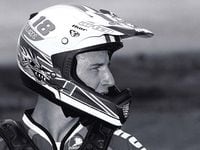
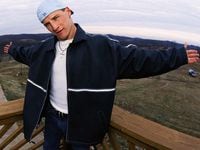
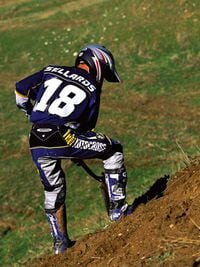
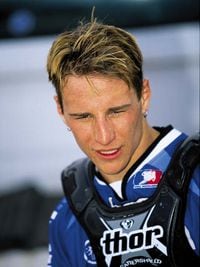
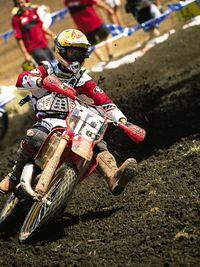
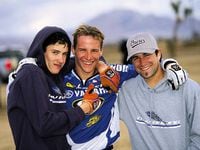
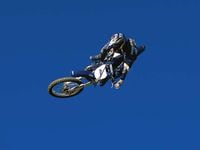
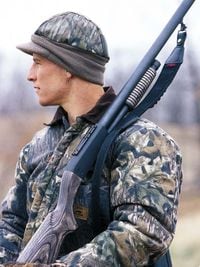
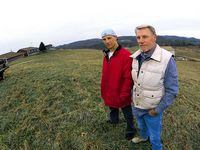
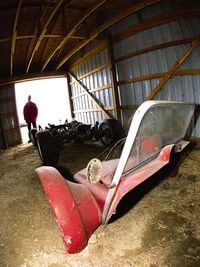
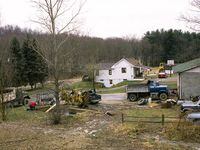
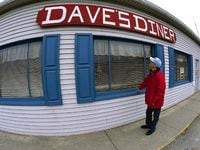
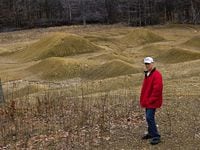
/cloudfront-us-east-1.images.arcpublishing.com/octane/WX7RDB74WNG4LEJX357DVYVDIU.jpg)
/cloudfront-us-east-1.images.arcpublishing.com/octane/MYU2ARUAFFGDTAPV6NOPY54CFY.jpg)
/cloudfront-us-east-1.images.arcpublishing.com/octane/7OY2GP3FWFEDVEMDSLNGM6PZRM.jpg)
/cloudfront-us-east-1.images.arcpublishing.com/octane/VDOEVSAFZRCVHEE4XZUNE3M5AE.jpg)
/cloudfront-us-east-1.images.arcpublishing.com/octane/VZK3FKU3PJA55PTTINHZ4GWLWQ.jpg)
/cloudfront-us-east-1.images.arcpublishing.com/octane/H7NHEGABYBFBLJQ6KK3T42MIKQ.jpg)
/cloudfront-us-east-1.images.arcpublishing.com/octane/Y3XYCFONBBBAHN6BWJDTWDY3FE.jpg)
/cloudfront-us-east-1.images.arcpublishing.com/octane/H6FFG4YQMREO3DTADIJMECNS7Y.jpg)
/cloudfront-us-east-1.images.arcpublishing.com/octane/QCUUDRRAIFHDDGB5OTZVKUS554.jpg)
/cloudfront-us-east-1.images.arcpublishing.com/octane/UA5HGEQGDBG3NMSZ4FA2CLB3XI.jpg)
/cloudfront-us-east-1.images.arcpublishing.com/octane/Z7YU6FSR6NEKVMKT5CZPMKIVLE.jpg)
/cloudfront-us-east-1.images.arcpublishing.com/octane/UT5IGBAKL5DXNMNO6BD6T6TTU4.jpg)
/cloudfront-us-east-1.images.arcpublishing.com/octane/DEQIDHQXMBG2TIUOUPTU2KTSMA.jpg)
/cloudfront-us-east-1.images.arcpublishing.com/octane/2Q5VNN7EFRGVJI4FERWSDLNQWE.jpg)
/cloudfront-us-east-1.images.arcpublishing.com/octane/AW6M53CBZ5EHXKLNO4S3TBWUEI.jpg)
/cloudfront-us-east-1.images.arcpublishing.com/octane/PIWO4PAYNBD4DOCMW72EY64PYA.jpg)
/cloudfront-us-east-1.images.arcpublishing.com/octane/Y4HWKELQUBCY5NZVNPRT32NRM4.jpg)
/cloudfront-us-east-1.images.arcpublishing.com/octane/SVL67IRM7BA5RH2NLSUDH4KD5E.jpg)
/cloudfront-us-east-1.images.arcpublishing.com/octane/ZNBBFO3NWNGJXEW7H45OZHOHEE.jpg)
/cloudfront-us-east-1.images.arcpublishing.com/octane/G3QLKG54BNCPZORQLJX6TVA5HQ.jpg)
/cloudfront-us-east-1.images.arcpublishing.com/octane/PWKRDKGKK5EDTIBJTPJ6JB7OJM.jpg)
/cloudfront-us-east-1.images.arcpublishing.com/octane/WHGK452CHNFFFGNF37OVRYA5RE.jpg)
/cloudfront-us-east-1.images.arcpublishing.com/octane/7MUP7HZ3RFFJVJUD2B3X7HQXUU.jpg)
/cloudfront-us-east-1.images.arcpublishing.com/octane/NOZZZJBTWBBUFEWJWRQ5WVCC24.jpg)